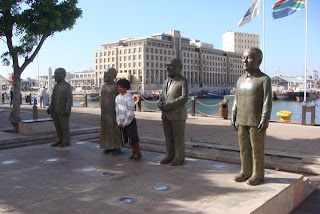From Anne:

Today was actually my first time inside a prison. I didn't know what to expect, so I was more or less ready for anything. The first half hour or more was spent in various security measures – entering the front gate (and having the trunk of our car searched), going in one entrance, then being asked to use a different entrance, then going through a metal detector, etc. It was all a bit chaotic because there were so many visitors – probably around 75 family members, all being allowed into the prison without prior security clearance and with minimal searching or scrutiny. The degree of support this course has from the prison administration and staff is quite remarkable. Most prisons would be very hesitant to allow an event like this, and certainly put off by the extra work all those visitors create for them.
Two things surprised me. The first was how many of the family members were so quick to forgive. Several said that they had forgiven a long time ago, and that brought a very emotional response from the inmates. Andrew mentioned that earlier in the week many of the men were feeling anxious, unsure if any family member would come for them. In the end all but one did, and despite a whole range of difficult emotions at work in such an intense situation, no one that I could see left angry.

The second thing that surprised me was the importance of confession for these men. During the service some of them admitted for the first time what they had actually done. Lying seems a necessity when defending themselves in court, for holding onto the support of family, and even in shielding themselves from the reality of their actions. Blaming other people or circumstances is also a way that they avoid facing their crimes. The image of one young man sticks in my mind – he stood up and said, “I don't know why I did the things that I did. But I can't point the finger at anyone but myself.”
Except for all the barbed wire, metal doors, guards, orange jumpsuits and tattoos, we could have been in any concrete-block church building. Okay, so all those things are pretty different. But one of the most surprising things for me during this visit was how “normal” it felt. It was not an intense emotional experience, I didn't feel frightened at any point, and I was strangely detached from it in many ways. I think this is because I have very little firsthand experience to contextualize what I saw. I had never been in a prison before, I have not been a crime victim nor has anyone in my family or friend circle that I know, I have never faced the kind of choices these men have faced or even seen the kind of neighborhood they had to grow up in. Yet as I reflect on the day, I am grateful for the opportunity to hear these stories and see a kind of reconciliation that is rarely to be found. I hope and pray that the changes these men spoke of with such desire will become reality for them, their families, and their communities.
























